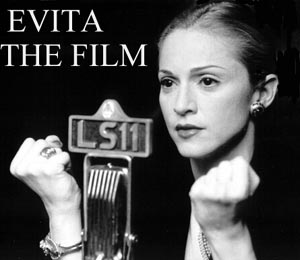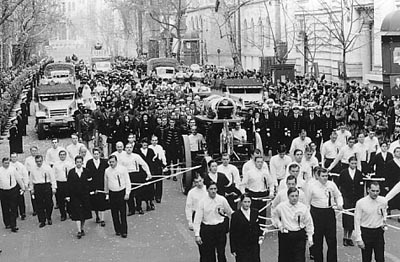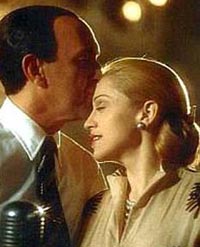 |
Movie Reviews
Another False Portrayal of the
Revolutionary South American Masses...
Evita reviewed by Marian T. Horvat
There are pros and cons about the movie Evita, a musical production that tells the life of Eva Peron and presents the public life of Argentina during the 1940s and ‘50s.
First, as a Catholic, I have to protest the disrespectful and blasphemous use of the Gregorian chant Salve Regina in the film. Even though it is well sung and in Latin, there is a variation in emphasis in the line: “Ad te clamamus exules filii Eva” (To thee do we come, poor banished children of Eva), to be understood as children of Eva Peron. Disgusting!
When one considers that the movie presents her as she was – a former prostitute and concubine of Peron – the simulation could not be more inappropriate. At the same time, a dozen or so couples are dancing a slow tango to this Salve Regina in a night club ambience. Again, extravagant and inappropriate. I don’t think any Catholic can approve this irreverence.

Madonna plays Eva Duarte Peron in Evita |
Morally speaking, I cannot recommend the show, especially for minors, since it makes a favorable representation of the life of a former prostitute who enjoyed an enormous success in this life. Eva Peron became the first lady of a country, a fashion icon, and an idol of the Argentine people. For the impressionable young mind, it can be difficult not to be awed by her dazzling success and think that the means she used to reach her end can be justified, or even imitated.
The movie is a musical, and I do mean musical. There is almost no dialogue. Everything is sung or recited – a kind of new style of operetta. It holds the interest throughout, even if you don’t like the pieces. I didn’t like much of it, especially the rock-driven parts. Most of the rhythms have something offbeat, perhaps to reflect the spirit of the revolutionary masses that supported Evita, or perhaps because it is what the public wants and expects today. Still, there is a varied repertoire, from complete cacophony, rock, fox-trot, blues and tango to popular songs, hymns and ballades.
I don’t know if it is modern fashion or not, but it seemed bad taste and strange to me that most of the songs start on a very high note. It would be fine if the actors could perform with ease in this range, but that was not the case. It is notorious in the performance of Antonio Banderas, playing the role of an omnipresent personage who speaks as the voice of good sense. Alternately he is the voice of the people, the voice of critics, the voice of History. But whatever the role of the moment he assumes, he almost always starts out on a high note outside his range, which obliges him to sing through his nose in a breathy falsetto. It gives two bad impressions: the incompetence of Banderas as a singer and the bad choice of director Alan Parker who picked Banderas to take on this role.
Madonna, who represents Evita, is a better singer and can reach her high notes more easily, but at times even she must strain and slips into that disagreeable falsetto. Perhaps this falsetto-performance is characteristic of a new school of art. I don’t find much value in it, and look forward to when this fad will pass.

Above, one of the effective scenes of the masses mourning the death of Evita Peron.
Many scenes were filmed in front of the Casa Rosada, below,
in Buenos Aires, which is one of the most cultured cities in South America

|
In order to present the “glory” of Evita and her popularity among the “people,” the movie makes grandiose scenes of countless massive popular manifestations. We see the people supporting her speeches, strike scenes, worker confrontations with the police, public solidarity during her final agony, and the apotheosis of support in the final viewing of her body and the funeral procession.
All these scenes were filmed in Argentina, often outside the Casa Rosada, the Presidential Palace in Buenos Aires. Instead of employing methods that insinuate great crowds, the director chose to assemble an imposing multitude. Certainly the effect is impressive and quite authentic, since these extras are actually Argentine people. There is nothing Hollywood about them, and the close-ups of their faces were highlights of the film for me.
The film presents the leftist political position of Evita and Juan Peron, first as minister and afterward, as president of Argentina. I was pleased with the criticism of the successive military dictators who ruled the country before Peron, since they were socialists and had bad administrations. It would have been fine with me if the film would have attacked the military dictators who came after Peron as well.
What the director forgot to censure, however, is that Peron and Evita were also socialists, actually on the cutting edge, more radical than the military men who preceded them. The social and economic chaos Argentina is experiencing today was caused in part by that long period (1943-1955; 1974-1976) of Peron’s demagogy and populism – in cohort with Evita, or with his next wife Isabelita. Without a doubt this period played a part in breaking the stability of Argentina. If the movie wanted to be even-handed, it would have made as severe a condemnation of Peron’s populism and demagogy as it did of the socialist military dictatorships. But it did not. Evita and Peron are presented as heroes. So, the naïve viewer who knows little or nothing of Argentine history is fooled, the victim of a socialist-biased propaganda.
In the same spirit, the director spared no opportunity to ridicule and disparage the aristocracy and upper classes of Argentina. It is a blatant injustice even though this kind of thing is common. I don’t know why here in the United States we deliberately blind ourselves to the authentic values of the most important countries of South America, namely Argentina, Brazil, Chile, Colombia, and Peru. Normally we lump them all together and treat them as underdeveloped Third World countries. We delight in exaggerating their economic and social problems. We hide from view their high culture and worthy Catholic traditions that in many aspects are more developed than our own and could serve as models for us. Why do most Americans have this prejudice against our Catholic brethren of the South? Does it come from our Protestant mentality? If so, it is past time to change it. But, I will leave this topic to be dealt with at another opportunity.
  
Madonna, right, who bears a good resemblance to the real Evita, left |
In the case of Evita, I disagree with the way the film ridicules the traditional social establishment in place at the time of Peron. Argentina was, and still is, one of the few reservoirs of Catholic distinction, donaire, and panache in the world. Distinction and excellence reveal themselves in everything – in the manners, clothing, familiar and social life, houses and furnishings, public and religious buildings. What the life of the 19th century had of the best in Europe was still alive in the Argentina of the 1940s and ‘50s, and in a certain way still survives today. This style of life is a wholesome echo of Catholic Civilization and a sound expression of how the Spanish noble spirit was transplanted to Argentina and generated a very respectable society.
Therefore, if one loves Catholic traditions, as I do, one should praise and encourage such distinction and noble spirit. This was not the case of the movie, which did the exact opposite. It packaged together the ridiculous pre-Peron dictators and the established society to mock and deride the ensemble. In my opinion, this is one of the revolutionary aspects of this film, and should be condemned.
Notwithstanding, the movie on the whole was made with intelligence and a certain verve. The story line was well conceived – an interesting beginning, a nice development, a vibrant end. The scenes are well conceived and filmed – vivacious, communicative, expressive. The music is surprisingly gripping throughout and reasonably appealing to the spectator.

In the film Peron appeared more noble than the real Peron |
The performance of Madonna reveals some undeniable artistic talent, which made me feel sorry that a gifted star has ended up as an icon of blasphemy. The deathbed scene actually provides matter for a serious meditation. In it, Evita lamented the fact she could only enjoy life for 33 years, and remarked how short the years seemed on one’s deathbed. The Catholic viewer is reminded of the fleeting glory of even the greatest worldly fame and honor, and remembers the counsel of St. Ignatius: What does it profit one to gain the whole world and lose his soul for all eternity? I would wish that Madonna the star would reflect on this lesson and learn from it.
In fact, in the movie she represents Evita the celebrity quite well, with a surprising physical resemblance. But something was lacking. I didn’t sense in Madonna any of that grand charisma that the real Evita had. But this is not a fault of the star or the director. Charisma is not a transmissible thing.
Antonio Banderas, who I consider a good actor, did not impress me at all with this performance. Like the notes he strains to reach, his frequent expressions of indignation and sardonic sneers seem artificial and overdone. He is not feeling what he is performing and singing, just cocking his head and making faces.
The actor who represents Peron, Jonathan Pryce, does a decent job. I would critique only two points, one major and the other minor. The major one: the historical Peron was a very vulgar man, but Pryce represented him as refined and noble. This makes Peron a more attractive figure, but it certainly doesn’t match the reality. The minor one: for some reason he almost always has an expression on his eyes as if he were preparing to laugh. Perhaps the director told him this would represent self-assurance. That simply isn’t the case, and it doesn’t work.

Posted January 19, 2004
|
Movie Reviews | Home | Books | CDs | Search | Contact Us

© 2002- Tradition in Action, Inc. All Rights Reserved
|
 |
|